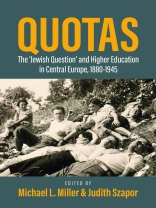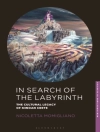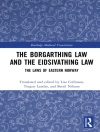In 1920, the Hungarian parliament introduced a Jewish quota for university admissions, making Hungary the first country in Europe to pass antisemitic legislation following World War I. Quotas explores the ideologies and practices of quota regimes and the ways quotas have been justified, implemented, challenged, and remembered from the late nineteenth century until the middle of the twentieth century. In particular, the volume focuses on Central and Eastern Europe, with chapters covering the origins of quotas, the moral, legal, and political arguments developed by their supporters and opponents, and the social and personal impact of these attempts to limit access to higher education.
Tabela de Conteúdo
Introduction: Antisemitic Arithmetic
Michael L. Miller and Judith Szapor
Part I: Anti-Jewish Quotas in Central Europe: Historical Roots
Chapter 1. Quotas and the “Jewish Question” in Imperial Austria
Jeremy King
Chapter 2. The (Great) Numbers Game: Demographic Anxieties and Quotas in Nineteenth and Twentieth Century Romania and the Global Antisemitic Imaginary
Andrei Dan Sorescu and Raul Cârstocea
Chapter 3. The Prehistory of the Hungarian Numerus Clausus Law
Miklós Konrád
Chapter 4. Jews in the Hungarian Medical Profession, 1782–1947. A Socio-Historical Report
Victor Karady
Part II: Down by Law: The Numerus Clausus in Hungary
Chapter 5. Mária M. Kovács, the Historian
András Kovács
Chapter 6. The Hungarian Numerus Clausus: Ideology, Apology and History, 1919-1945
Mária M. Kovács
Chapter 7. From Numerus Clausus to Numerus Nullus
Andor Ladányi, translated by Judith Szapor
Part III: The Politics of Exclusion in Central Europe
Chapter 8. Antisemitic Pacts: Student Fraternities and the Exclusion of Jews at Austrian Universities in the Interwar Period
Andreas Huber
Chapter 9. From Numerus Clausus Demands to Antisemitic Laws: Student Antisemitism in Romania, 1888-1938
Roland Clark
Chapter 10. Anti-Jewish Quotas in Interwar Poland: Towards a Reconsideration of the Appeal of Fascism in East Central Europe
Grzegorz Krzywiec
Chapter 11. “Troublesome Foreigners”: The Protests against Jewish Students at Universities in Vienna, Bratislava and Brno, and the Dispute over Quotas in Czechoslovakia, 1929–1932’
Miloslav Szabó
Part IV: Jewish Responses, Jewish Fates
Chapter 12. Next Year in Brno? Brno’s Significance for Hungarian Jews in the Age of the Numerus Clausus and Beyond
Ágnes Katalin Kelemen
Chapter 13. “You can become anything, except a pediatrician;” Exploring the gendered impact of Hungary’s Numerus Clausus Law
Judith Szapor
Chapter 14. A Foreign Relations Fiasco? Reactions to the Hungarian Numerus Clausus in Weimar Berlin
Michael L. Miller
Afterword: The Enduring Legacy of Quotas
Michael L. Miller and Judith Szapor
Sobre o autor
Michael L. Miller is head of the Nationalism Studies Program at Central European University in Vienna, Austria. He is the author of Rabbis and Revolution: The Jews of Moravia in the Age of Emancipation (2011) and other works on Habsburg and Habsburg-Jewish history. He is currently completing a book manuscript entitled “Manovill: A Tale of Two Hungarys.”












